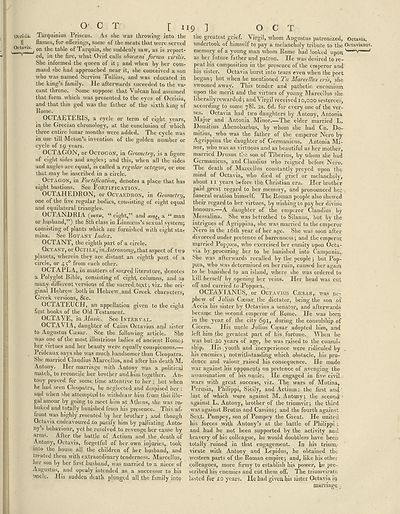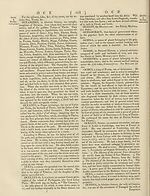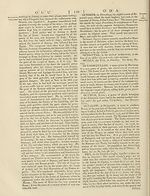Encyclopaedia Britannica > Volume 15, NIC-PAR
(131) Page 119
Download files
Complete book:
Individual page:
Thumbnail gallery: Grid view | List view

O' C T [I
Ocrisia. Tarquinius Priscus. As she was throwing into the
(i flames, for offerings, some of the meats that were served
Octavia^ on tf,e taijie 0f Tarquin, she suddenly saw, as is report¬
ed, in the fire, what Ovid calls obscceni forma virilis.
She informed the queen of it; and when by her com¬
mand she had approached near it, she conceived a son
who was named Servius Tullius, and was educated in
the king’s family. He afterwards suceeded to the va¬
cant throne. Some suppose that Vulcan had assumed
that form which was presented to the eyes of Ocrisia,
and that this god was the father of the sixth kinn- of
Home.
OCTAETERIS, a cycle or term of eight years,
in the Grecian chronology, at the conclusion of which
three entire lunar months were added. The cycle was
in use till Melon’s invention of the golden number or
cycle of 19 years.
OCTAGON, or Octogon, in Geometry, is a figure
of eight sides and angles j and this, when all the sides
and angles are equal, is called a regular octagon, or one
that may be inscribed in a circle.
Octagon, in Fortification, denotes a place that has
eight bastions. See Fortification.
OCTAHEDRON, or Octakdron, in Geometry,
one of the five regular bodies, consisting of eight equal
and equilateral triangles.
OCTANDRIA (e*T<v, “ eight,” and cevijg, a “ man
or husband,”) the 8th class in Linnaeus’s sexual system;
consisting ot plants which are furnished with eight star
mina. See Botany Index.
OCTANT, the eighth part of a circle.
Octant, or Octii.k, in A.stronomy, that aspect of two
planets, wherein they are distant an eighth part of a
circle, or 450 from each other.
OCI APE A, in matters of sacred literature, denotes
a Polyglot Bible, consisting of eight, columns, and as
many different versions of the sacred tc^t; viz. the ori¬
ginal Hebrew both in Hebrew and Greek characters,
Greek versions, &c.
OCI ATEUCH, an appellation given to the eight
first books of the Old Testament.
OCTAVE, in Music. See Interval.
OCTA\ IA, daughter of Cains Octavius and sister
to Augustus Csesar. See the following article. She
was one of the most illustrious ladies of ancient Rome;
her virtues and her beauty were equally conspicuous.—-
Prideaux says she was much handsomer than Cleopatra.
She married Claudius Marcellus, and after his death M.
Antony. Her marriage with Antony was a political
match, to reconcile her brother and him together. An¬
tony proved for some time attentive to her ; but when
he had seen Cleopatra, he neglected and despised her:
and when she attempted to withdraw him from this ille¬
gal amour by going to meet him at Athens, she wras rer
buked and totally banished from his presence. This af¬
front was highly resented by her brother ; and though
Octavia endeavoured to pacify him by palliating Antor
ny’s behaviour, yet he resolved to revenge her cause by
arms. After the battle of Actium and the death of
Antony, Octavia, forgetful of her own injuries, took
into the house all the children of her husband, and
treated them with extraordinary tenderness. Marcellus,
her son by her first husband, was married to a niece of
Augustus, and openly intended as, a successor to his
uncle. His sudden death plunged all the family into
19 1 OCT
the greatest grief. Virgil, whom Augustus patronized, Octavia,
undertook of himself to pay a melancholy tribute to the Octavianus.
memory of a young man whom Rome had looked upon v—-
as her future father and patron. He was desired to re¬
peat his composition in the presence of the emperor and
his sister. Octavia burst into tears even when the poet
began; but when he mentioned Tu Marcellus cris, she
swooned away. This tender and pathetic encomium
upon the merit and the virtues of young Marcellus she
liberallyrewarded; and\ irgil received 10,000 sesterces,
according to some 78!. 2s. 6d. for every one of the ver¬
ses. Octavia had two daughters by Antony, Antonia
Major and Antonia Minor.—The elder married L.
Domitius Ahenobarbus, by whom she had Cn. Do-
mitius, who was the father of the emperor Nero by
Agrippina the daughter of Germanicus. Antonia Mi¬
nor, who was as virtuous and as beautiful as her mother,
married Drusus the son of Tiberius, by whom she had
Germanicus, and Claudius who reigned before Nero.
The death of Marcellus constantly preyed upon the
mind of Octavia, who died of grief or melancholy,
about 11 years before the Christian era. Her brother
paid,great regard to her memory, and pronounced her
funeral oration himself. The Roman people also showed
their regard to her virtues, by wishing to pay her divine
honours.—A daughter of the emperor Claudius by
Messalina. She was betrothed to Silanus, but by the
intrigues of Agrippina, she was married to the emperor
Neirn in the 16th year of her age. She wras soon after
divorced under pretence of barrenness; and the emperor;
married Poppsea, who exercised her enmity upon Octa¬
via by procuring her to be banished into Campania.
She was afterwards recalled by the people ; but Pop-
pa:a, who was determined on her ruin, caused her again
to be banished to an island, where she was ordered to
kill herself by opening her veins. Her head was cut
oft and carried to Poppoea.
OCTAVIANUS, or Octavius Cesar, was ntv
phew ot Julius Caesar the dictator, being the son of
Accia his sister by Octavius a senator, and afterwards
became the second emperor of Rome. He was bom
in the year of the city 691, during the consulship of
Cicero. His uncle Julius Caesar adopted him, and
left him the greatest part of his , fortune. When he
wms but 20 years of age, he was raised to the consul¬
ship. His .youth and inexperience were ridiculed by
his enemies; notwithstanding which obstacle, his pru¬
dence and valour raised his consequence. He made
w ar against his opponent? on pretence of avenging the
assassination of his uncle. He engaged in five civil
wars with great success, viz. The wars of Mutina,
Perusia, Philippi, Sicily, and Actium : the first an4
last of which wore against M. Antony; the second
against L. Antony, brother of the triumvir; the third
was against Brutus and Cassius; and the fourth against
Sext. Pompey, son of Pompey the Great. He united
his forces with Antony’s at the battle of Philippi ;
and had he not been supported by the activity and
bravery of his colleague, he would doubtless have been
totally ruined in that engagement. In his triuni;
virate with Antony and Lepidus, he obtained the
western parts of the Roman empire; and, like his other
colleagues, more firmy to establish his power, fie pro¬
scribed his enemies and cut them off. The triumvirate
lasted for 10 years. He had given his sister Octavia ip
marriage
Ocrisia. Tarquinius Priscus. As she was throwing into the
(i flames, for offerings, some of the meats that were served
Octavia^ on tf,e taijie 0f Tarquin, she suddenly saw, as is report¬
ed, in the fire, what Ovid calls obscceni forma virilis.
She informed the queen of it; and when by her com¬
mand she had approached near it, she conceived a son
who was named Servius Tullius, and was educated in
the king’s family. He afterwards suceeded to the va¬
cant throne. Some suppose that Vulcan had assumed
that form which was presented to the eyes of Ocrisia,
and that this god was the father of the sixth kinn- of
Home.
OCTAETERIS, a cycle or term of eight years,
in the Grecian chronology, at the conclusion of which
three entire lunar months were added. The cycle was
in use till Melon’s invention of the golden number or
cycle of 19 years.
OCTAGON, or Octogon, in Geometry, is a figure
of eight sides and angles j and this, when all the sides
and angles are equal, is called a regular octagon, or one
that may be inscribed in a circle.
Octagon, in Fortification, denotes a place that has
eight bastions. See Fortification.
OCTAHEDRON, or Octakdron, in Geometry,
one of the five regular bodies, consisting of eight equal
and equilateral triangles.
OCTANDRIA (e*T<v, “ eight,” and cevijg, a “ man
or husband,”) the 8th class in Linnaeus’s sexual system;
consisting ot plants which are furnished with eight star
mina. See Botany Index.
OCTANT, the eighth part of a circle.
Octant, or Octii.k, in A.stronomy, that aspect of two
planets, wherein they are distant an eighth part of a
circle, or 450 from each other.
OCI APE A, in matters of sacred literature, denotes
a Polyglot Bible, consisting of eight, columns, and as
many different versions of the sacred tc^t; viz. the ori¬
ginal Hebrew both in Hebrew and Greek characters,
Greek versions, &c.
OCI ATEUCH, an appellation given to the eight
first books of the Old Testament.
OCTAVE, in Music. See Interval.
OCTA\ IA, daughter of Cains Octavius and sister
to Augustus Csesar. See the following article. She
was one of the most illustrious ladies of ancient Rome;
her virtues and her beauty were equally conspicuous.—-
Prideaux says she was much handsomer than Cleopatra.
She married Claudius Marcellus, and after his death M.
Antony. Her marriage with Antony was a political
match, to reconcile her brother and him together. An¬
tony proved for some time attentive to her ; but when
he had seen Cleopatra, he neglected and despised her:
and when she attempted to withdraw him from this ille¬
gal amour by going to meet him at Athens, she wras rer
buked and totally banished from his presence. This af¬
front was highly resented by her brother ; and though
Octavia endeavoured to pacify him by palliating Antor
ny’s behaviour, yet he resolved to revenge her cause by
arms. After the battle of Actium and the death of
Antony, Octavia, forgetful of her own injuries, took
into the house all the children of her husband, and
treated them with extraordinary tenderness. Marcellus,
her son by her first husband, was married to a niece of
Augustus, and openly intended as, a successor to his
uncle. His sudden death plunged all the family into
19 1 OCT
the greatest grief. Virgil, whom Augustus patronized, Octavia,
undertook of himself to pay a melancholy tribute to the Octavianus.
memory of a young man whom Rome had looked upon v—-
as her future father and patron. He was desired to re¬
peat his composition in the presence of the emperor and
his sister. Octavia burst into tears even when the poet
began; but when he mentioned Tu Marcellus cris, she
swooned away. This tender and pathetic encomium
upon the merit and the virtues of young Marcellus she
liberallyrewarded; and\ irgil received 10,000 sesterces,
according to some 78!. 2s. 6d. for every one of the ver¬
ses. Octavia had two daughters by Antony, Antonia
Major and Antonia Minor.—The elder married L.
Domitius Ahenobarbus, by whom she had Cn. Do-
mitius, who was the father of the emperor Nero by
Agrippina the daughter of Germanicus. Antonia Mi¬
nor, who was as virtuous and as beautiful as her mother,
married Drusus the son of Tiberius, by whom she had
Germanicus, and Claudius who reigned before Nero.
The death of Marcellus constantly preyed upon the
mind of Octavia, who died of grief or melancholy,
about 11 years before the Christian era. Her brother
paid,great regard to her memory, and pronounced her
funeral oration himself. The Roman people also showed
their regard to her virtues, by wishing to pay her divine
honours.—A daughter of the emperor Claudius by
Messalina. She was betrothed to Silanus, but by the
intrigues of Agrippina, she was married to the emperor
Neirn in the 16th year of her age. She wras soon after
divorced under pretence of barrenness; and the emperor;
married Poppsea, who exercised her enmity upon Octa¬
via by procuring her to be banished into Campania.
She was afterwards recalled by the people ; but Pop-
pa:a, who was determined on her ruin, caused her again
to be banished to an island, where she was ordered to
kill herself by opening her veins. Her head was cut
oft and carried to Poppoea.
OCTAVIANUS, or Octavius Cesar, was ntv
phew ot Julius Caesar the dictator, being the son of
Accia his sister by Octavius a senator, and afterwards
became the second emperor of Rome. He was bom
in the year of the city 691, during the consulship of
Cicero. His uncle Julius Caesar adopted him, and
left him the greatest part of his , fortune. When he
wms but 20 years of age, he was raised to the consul¬
ship. His .youth and inexperience were ridiculed by
his enemies; notwithstanding which obstacle, his pru¬
dence and valour raised his consequence. He made
w ar against his opponent? on pretence of avenging the
assassination of his uncle. He engaged in five civil
wars with great success, viz. The wars of Mutina,
Perusia, Philippi, Sicily, and Actium : the first an4
last of which wore against M. Antony; the second
against L. Antony, brother of the triumvir; the third
was against Brutus and Cassius; and the fourth against
Sext. Pompey, son of Pompey the Great. He united
his forces with Antony’s at the battle of Philippi ;
and had he not been supported by the activity and
bravery of his colleague, he would doubtless have been
totally ruined in that engagement. In his triuni;
virate with Antony and Lepidus, he obtained the
western parts of the Roman empire; and, like his other
colleagues, more firmy to establish his power, fie pro¬
scribed his enemies and cut them off. The triumvirate
lasted for 10 years. He had given his sister Octavia ip
marriage
Set display mode to:
![]() Universal Viewer |
Universal Viewer | ![]() Mirador |
Large image | Transcription
Mirador |
Large image | Transcription
Images and transcriptions on this page, including medium image downloads, may be used under the Creative Commons Attribution 4.0 International Licence unless otherwise stated. ![]()
| Encyclopaedia Britannica > Encyclopaedia Britannica > Volume 15, NIC-PAR > (131) Page 119 |
|---|
| Permanent URL | https://digital.nls.uk/192583401 |
|---|
| Attribution and copyright: |
|
|---|
| Shelfmark | EB.11 |
|---|---|
| Description | Ten editions of 'Encyclopaedia Britannica', issued from 1768-1903, in 231 volumes. Originally issued in 100 weekly parts (3 volumes) between 1768 and 1771 by publishers: Colin Macfarquhar and Andrew Bell (Edinburgh); editor: William Smellie: engraver: Andrew Bell. Expanded editions in the 19th century featured more volumes and contributions from leading experts in their fields. Managed and published in Edinburgh up to the 9th edition (25 volumes, from 1875-1889); the 10th edition (1902-1903) re-issued the 9th edition, with 11 supplementary volumes. |
|---|---|
| Additional NLS resources: |
|

